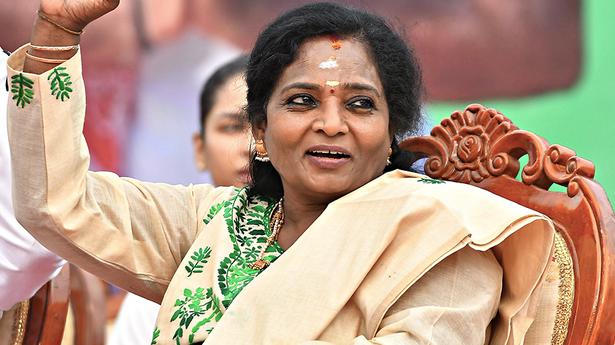
Puducherry’s GSDP grew by 2.90% and per capita income by 0.42 %: Lt. Governor
The Hindu
Lt. Governor Tamilisai Soundararajan on August 10 said that GSDP of the U.T. grew higher compared to the previous year
The Union Territory's Gross State Domestic Product grew by 2.90% and per capita income by 0.42% in 2021-22 compared to the previous year, Lt. Governor Tamilisai Soundararajan said here on Wednesday.
Delivering her customary address on the opening day of the budget session of Puducherry Assembly amid a walk out by principal Opposition DMK and its ally Congress, the Lt. Governor said the GSDP of the U.T. has been estimated at ₹ 38,285 crore (current price) for 2021-22, which is 2.90% higher than the previous year.
The per capita income of U.T. increased from ₹2,15,583 (current price) for the year 2020-21 to ₹2,16,495 (current price) for the year 2021-22, showing a growth of 0.42%.
The government in the last financial year achieved a record high of 104% of revenue target. Of the total outlay of ₹10,414 crore last fiscal, the government spent ₹ 9, 793.29 crore, Dr. Tamilisai said.
Stating that UT was slowly coming out of the COVID -19 induced economic slowdown, the Lt. Governor said U.T. was able to achieve 6.50 % increase in tourist arrival despite restrictions in place due to the pandemic.
Listing out various achievements of the government, the Lt. Governor said it was implementing schemes to improve income of farmers and welfare measures for the upliftment of marginalised sections.
As soon as Dr. Tamilisai arrived in the house to deliver her address, DMK and Congress members wearing black shirts were on their feet protesting against the NDA government at Centre and U.T.

“Writing, in general, is a very solitary process,” says Yauvanika Chopra, Associate Director at The New India Foundation (NIF), which, earlier this year, announced the 12th edition of its NIF Book Fellowships for research and scholarship about Indian history after Independence. While authors, in general, are built for it, it can still get very lonely, says Chopra, pointing out that the fellowship’s community support is as valuable as the monetary benefits it offers. “There is a solid community of NIF fellows, trustees, language experts, jury members, all of whom are incredibly competent,” she says. “They really help make authors feel supported from manuscript to publication, so you never feel like you’re struggling through isolation.”

Several principals of government and private schools in Delhi on Tuesday said the Directorate of Education (DoE) circular from a day earlier, directing schools to conduct classes in ‘hybrid’ mode, had caused confusion regarding day-to-day operations as they did not know how many students would return to school from Wednesday and how would teachers instruct in two modes — online and in person — at once. The DoE circular on Monday had also stated that the option to “exercise online mode of education, wherever available, shall vest with the students and their guardians”. Several schoolteachers also expressed confusion regarding the DoE order. A government schoolteacher said he was unsure of how to cope with the resumption of physical classes, given that the order directing government offices to ensure that 50% of the employees work from home is still in place. On Monday, the Commission for Air Quality Management in the National Capital Region and Adjoining Areas (CAQM) had, on the orders of the Supreme Court, directed schools in Delhi-NCR to shift classes to the hybrid mode, following which the DoE had issued the circular. The court had urged the Centre’s pollution watchdog to consider restarting physical classes due to many students missing out on the mid-day meals and lacking the necessary means to attend classes online. The CAQM had, on November 20, asked schools in Delhi-NCR to shift to the online mode of teaching.









